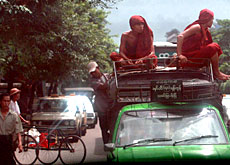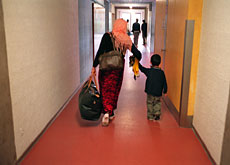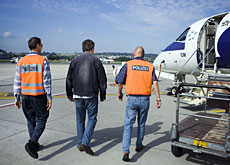Grim reminder helps mark rights day

The Swiss Red Cross is highlighting abuses against people by opening one of its clinics for torture victims to the general public on Human Rights Day.
As the United Nations prepares to celebrate the 60th anniversary of the Universal Declaration of Human Rights, many continue to suffer around the world because these rights are not yet a “living reality” everywhere.
Brigitte Ambühl is the medical director at the Swiss Red Cross in charge of four clinics for victims of torture and war. She says it’s important that the Swiss see and feel what it means to be tortured – and understand the irreversible damages.
“It’s difficult to get people to listen to you when you say you are going to talk about torture, torture victims and therapy,” she said. “It’s something very horrible, which we know about and don’t want to hear.”
Since 1995, the Swiss Red Cross has been running outpatient clinics in Bern – which is opening its doors to the public on Monday – Geneva, Lausanne and Zurich offering a range of therapies for asylum seekers suffering from post-traumatic stress caused by torture and war.
According to a study, one in four refugees in Switzerland suffers the daily consequences of systematic violence, resulting in physical pain, flashbacks, panic attacks, sleeping disorders and depression
Last year the Swiss Red Cross treated 1,100 people – generally men (70 per cent), aged 25-45, from Kurdish regions (Turkey, Iraq, Syria) or from Africa (Tunisia and Eritrea), but also children and adolescents.
Since May 2007 it has also started providing psychological and medical treatment to illegal immigrants. Under a new asylum law, people who are no longer allowed to stay in Switzerland do not receive financial support.
“The problem is sick people wait until the last minute as they are afraid of being caught and of having to leave the country. If they fall ill they are usually acute patients,” explained Ambühl.
“It’s the right time to show that everyone in Switzerland has the right to healthcare.”
UN campaign
United Nations Secretary-General Ban Ki-moon launched a special action on Human Rights Day to mark the start of a yearlong UN campaign leading up to the 60th anniversary of the Universal Declaration of Human Rights in December 2008.
“It is our duty to ensure that these rights are a living reality – that they are known, understood and enjoyed by everyone, everywhere,” said the UN secretary-general in a statement.
In Switzerland, 70 charities, religious and non-governmental organisations are marking the day by collecting signatures in a bid to increase Swiss development aid and thus ensure respect for “fundamental human rights, such as the right to food, education, drinking water and health”.
Never again
Monday commemorates the anniversary of the Universal Declaration of Human Rights, signed in 1948 by governments who promised to defend 30 basic rights.
“It’s an extremely important human rights instrument – a cornerstone which we constantly refer back to,” Manon Schick, spokesperson for Amnesty International Switzerland, told swissinfo. “It remains modern, even 59 years after its adoption.”
Its catalogue highlights all of the major conventions of the post-war years, “allowing human rights organisations, governments and victims to obtain compensation and justice”, said Schick.
But since the declaration was introduced, millions around the world have seen their basic rights abused.
The document’s main weakness is that it remains just a text of intention – a piece of paper with no binding power.
“And today, while most governments are aware of the importance of human rights, political commitment is lacking,” admitted Schick. “We have to fight on a daily basis so that all the rights in the document are respected universally. It’s a constant battle.”
swissinfo, Simon Bradley
Human Rights Day is celebrated annually across the world on December 10.
The date was chosen to honour the United Nations General Assembly’s adoption and proclamation, on December 10, 1948, of the Universal Declaration of Human Rights, the first global enunciation of human rights.
The commemoration was established in 1950, when the General Assembly invited all states and interested organisations to celebrate the day as they saw fit.
In a televised speech on Monday, Swiss President Micheline Calmy-Rey said human rights were not utopian and “concerned each and every one of us”.
“Human rights are not abstract. They affect people by making them free – free to express their opinions, away from arbitrary comment, oppression and extermination…They are essential to the richness and creativity of man, to achieving peace, harmony and prosperity in society,” said the president.
Ahead of the 60th anniversary of the Universal Declaration in December 2008, the foreign ministry is publishing a book entitled “A look at human rights – focus on human rights”.
The book has comments by UN Secretary-General Ban Ki-moon, Nobel Prize winners Shirin Ebadi and Jimmy Carter, Swiss President Micheline Calmy-Rey and Swiss writer Adolf Muschg. It is available at most bookshops in Switzerland.

In compliance with the JTI standards
More: SWI swissinfo.ch certified by the Journalism Trust Initiative




You can find an overview of ongoing debates with our journalists here . Please join us!
If you want to start a conversation about a topic raised in this article or want to report factual errors, email us at english@swissinfo.ch.